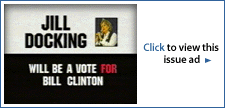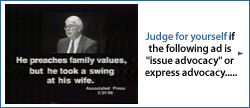 | 


 An issue ad is, by definition, supposed to discuss broad political issues
rather than specific candidates. In the landmark 1976 decision, Buckley v.
Valeo, the Supreme Court created two broad categories of political
advertising: express advocacy and issue advocacy. Express advocacy, as the
name suggests, is advertising that explicitly recommends the election or defeat
of a candidate. According to the Court's decision, express advocacy ads are
subject to federal campaign regulations. That means organizations sponsoring
express advocacy have to abide by federal laws restricting the size of
individual donations, barring corporate and union contributions, and requiring
public disclosure of their contributors. But in the case of issue advocacy,
the Court ruled that ads intended to educate the public on broader issues are
protected by First Amendment guarantees of free speech and are outside the
reach of federal election laws. This means that the sponsors of issue ads are
not required to publicly disclose the sources of their funding - and there is
no limit on the amount of money any individual, union or corporation can
contribute to an issue ad campaign. These important differences in how the
two types of ads can be funded makes the distinction between them crucial.
An issue ad is, by definition, supposed to discuss broad political issues
rather than specific candidates. In the landmark 1976 decision, Buckley v.
Valeo, the Supreme Court created two broad categories of political
advertising: express advocacy and issue advocacy. Express advocacy, as the
name suggests, is advertising that explicitly recommends the election or defeat
of a candidate. According to the Court's decision, express advocacy ads are
subject to federal campaign regulations. That means organizations sponsoring
express advocacy have to abide by federal laws restricting the size of
individual donations, barring corporate and union contributions, and requiring
public disclosure of their contributors. But in the case of issue advocacy,
the Court ruled that ads intended to educate the public on broader issues are
protected by First Amendment guarantees of free speech and are outside the
reach of federal election laws. This means that the sponsors of issue ads are
not required to publicly disclose the sources of their funding - and there is
no limit on the amount of money any individual, union or corporation can
contribute to an issue ad campaign. These important differences in how the
two types of ads can be funded makes the distinction between them crucial.
In a footnote to the Buckley decision, the Court tried to provide some
guidance on the dividing line between express and issue advocacy. According to
this footnote, express advocacy is any advertising containing such clear
expressions of support or opposition as "vote for," "elect," "support," "vote
against," "defeat," or "reject." These phrases, originally intended as general
guidance, have become widely accepted as the defining test of express advocacy.
While extensive legal and political debate continues, most lower courts have
ruled that ads which avoid Buckley's "magic words" cannot be considered
express advocacy. So under the present law, such ads are considered issue ads
- no matter how critical or supportive of a given candidate they may be.

In 1996, a variety of groups took advantage of this loophole in the law.
Political parties, labor unions, and a host of nonprofit and corporate-funded
advocacy groups launched an unprecedented barrage of issue advocacy ads.
Together they spent an estimated $135-150 million on ads which were completely
unregulated by federal election laws. The most comprehensive study of this
explosion of issue ads is the Annenberg Public Policy Center's Issue
Advocacy During the 1996 Campaign: A Catalog. Click here to download a copy of this report at the Annenberg site.
The Annenberg report found that 90 percent of the so-called "issue ads" run in
1996 named a specific candidate, and the majority of them were attacks on the
sponsoring groups' political opponents. Although these ads were clearly
intended to influence voters, because they avoided Buckley's "magic words,"
they were legally "issue ads."
 The danger of this loophole is clear. By carefully constructing ads to avoid
Buckley's magic words, corporations, labor unions and wealthy individuals can
funnel unlimited amounts of money into the electoral process - purchasing
millions of dollars of ads without any obligation to disclose their involvement
to the voters. It is now legally possible for groups representing neither
candidate in a race to spend more money on political advertising than the
candidates themselves. As one critic has said, this could reduce candidates
for federal office to "bit players" in their own campaigns. More importantly,
it leaves voters in the dark about the source of the political messages they
are receiving.
The danger of this loophole is clear. By carefully constructing ads to avoid
Buckley's magic words, corporations, labor unions and wealthy individuals can
funnel unlimited amounts of money into the electoral process - purchasing
millions of dollars of ads without any obligation to disclose their involvement
to the voters. It is now legally possible for groups representing neither
candidate in a race to spend more money on political advertising than the
candidates themselves. As one critic has said, this could reduce candidates
for federal office to "bit players" in their own campaigns. More importantly,
it leaves voters in the dark about the source of the political messages they
are receiving.

The Shays-Meehan bill passed by the U.S. House of Representatives and the
McCain-Feingold bill which, as of October 6 1998, is blocked in the Senate both
impose some limitations on issue advocacy which do not currently exist. Both
bills would require anyone who runs an ad mentioning a specific candidate
within two months of the election to play by the rules and pay for those ads
with money legal under the campaign finance laws. Under this legislation, the
bulk of the advertising done by both of Triad's nonprofit arms - and
much of the "issue advertising" done by the DNC and RNC on behalf of their
presidential candidates - would have been illegal in 1996.
While debate continues about the legality of the issue ad loophole - and of the
proposals to plug it - other legal questions have been raised about the
activities of organizations like Triad's Citizens for the Republic Education
Fund and Citizens for Reform, and the Republican National Committee-founded
Coalition for our Children's Future.

Nonprofit organizations are not bound by the federal election laws which govern
the behavior of political parties and candidates. Nonprofits are not required
to disclose their donors to the public, and there are no legal limits on the
amount of money they can accept from any given source. And while political
parties and individual candidates are barred from taking money from particular
sources - such as unions or corporations - nonprofits face no such
restrictions.
But that freedom from regulation comes with a price. Nonprofit organizations
are granted their tax-exempt status in exchange for an understanding they will
have little or no direct involvement in political campaigns. As the IRS code
on nonprofit groups states, "the promotion of social welfare does not include
direct or indirect participation or intervention in political campaigns on
behalf of or in opposition to any candidate for public office."
Yet in 1996, a number of organizations which won tax exempt status from the
IRS as "social welfare" organizations seemed to exist solely for the purpose of
political advertising. The records subpoenaed by Senate investigators from the
Coalition for our Children's Future, and the two Triad
nonprofits show
those organizations performed no education or social welfare function beyond
running ads, direct mail campaigns and phone banks intended to influence
particular races. Nevertheless, these groups used their nonprofit status to
shield the identity of their donors - from whom they accepted unlimited
contributions. Thus their partisan political activities went on below the
radar screen of campaign disclosure laws - and was subsidized by American
taxpayers.
 |  |  |